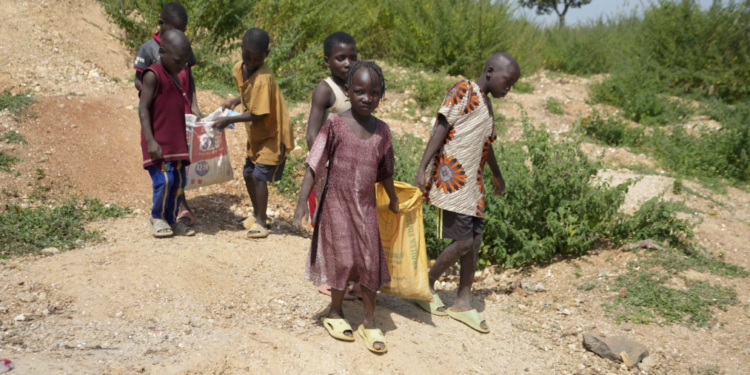Dec 12, 2024 Story by: Editor
In Nasarawa, Nigeria, 6-year-old Juliet Samaniya spends her days under the blazing sun, chipping away at white rocks with rudimentary tools. Dust covers her tiny frame as she works tirelessly for less than a dollar a day, surrounded by mineshafts and farmland likely to be cleared in the quest for lithium—a key component in batteries powering the clean energy transition.
| Image Source: AP News |
Juliet’s mother, Abigail Samaniya, acknowledges her daughter should be in school but says financial struggles force her into mining. “That is the only option,” she admitted.
Globally, over a million children work in mines, according to the International Labour Organization. In Africa, the issue is particularly severe due to widespread poverty, limited educational access, and weak regulatory enforcement. These children endure unsafe conditions, long hours, and health risks, including respiratory ailments caused by toxic dust.
As global demand for lithium surges, Nigeria’s mineral wealth has attracted attention, but at a steep cost—exploiting vulnerable children. Chinese companies, which dominate Nigeria’s poorly regulated mining sector, are frequently linked to illegal mining and labor abuses. When contacted, RSIN Nigeria Limited, a company involved in purchasing lithium, did not respond to repeated requests for comment. The Chinese embassy in Abuja, however, stated that its businesses comply with local laws and regulations.
Hazardous and Illegal Practices
Pasali, a small village near Nigeria’s capital, has become a hub for illegal mining. For over a decade, residents like 25-year-old Shedrack Bala have dug into the land, using basic tools and explosives. The risks are immense—miners face premature dynamite explosions, suffocation, and tunnel collapses. Children like Juliet and her peers toil alongside adults, extracting, sorting, and bagging lithium ore.
During a recent visit, Associated Press reporters observed Juliet’s group of children sort 22 kilograms of ore in an hour. A day’s labor typically earns them about 4,000 naira (roughly $2.42), which they share. For Juliet’s family, even basic education fees are unaffordable, leaving her and other children without the opportunity to attend school. Sule Dantini, the local schoolmaster, revealed that mining activities have drastically reduced attendance from 300 pupils to just three.
| Nineteen-year-old Bashir Rabiu poses for a photograph at an unregulated lithium mining site in Paseli, Nigeria, on Tuesday, November 5, 2024. (AP Photo/Sunday Alamba) |
Unregulated Profiteering
Illegal mining in Nigeria thrives through informal networks of buyers and sellers, many of whom pay officials to overlook their operations. Aliyu Ibrahim, a lithium merchant, admitted that children working in mines help their families survive amidst dire poverty. Meanwhile, companies like RSIN Nigeria Limited continue to purchase lithium without scrutiny of its origins or the labor conditions involved.
China’s involvement in such practices has drawn criticism, with reports of illicit mining and labor exploitation surfacing in several countries. The Chinese embassy, however, emphasized its government’s zero-tolerance policy toward illegal mining and labor.
Urgent Reforms Needed
Activists and experts stress the need for responsible mining practices to protect human rights. Nigerian activist Philip Jakpor stated, “Revenue generation seems to have trumped the need to protect human rights,” calling for ethical supply chain practices. Juliane Kippenberg of Human Rights Watch warned that rising lithium demand necessitates stronger safeguards for vulnerable workers.
The Nigerian government has announced measures, including mining marshals and amendments to mining laws, to combat illegal operations and reduce child labor. Ministry spokesperson Segun Tomori highlighted revamped social programs aimed at keeping children in school.
Despite the grim realities, Juliet’s mother remains hopeful. “I still want her to go to school, have a better life, work in an office, not mine forever,” she said. Source: AP News

















